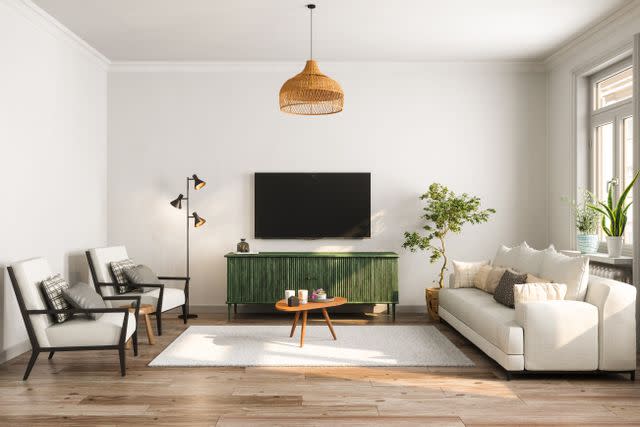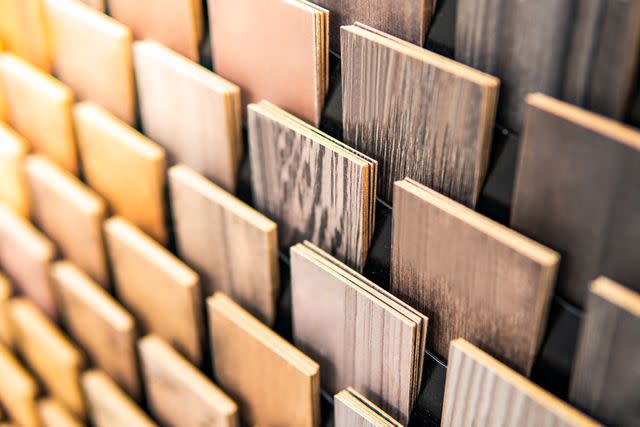The Pros and Cons of Vinyl Plank Flooring—an Affordable Alternative to Hardwood
The material is waterproof and scratch-resistant, making it ideal for areas with high foot traffic.
Putting new floors in your home can be a time-consuming and costly renovation process, which is why it's important to choose a flooring type you're happy with. While hardwood has been a timeless option for decades, there are many affordable alternative flooring options that are known for being just as beautiful.
One material that is especially popular is vinyl plank flooring, which has a reputation for being waterproof, scratch-resistant, and easy to care for. If you're considering installing vinyl plank flooring in your home but you're not sure it has the same timelessness as hardwood, we're here to help. Ahead, we're sharing everything you need to know about vinyl plank flooring, including its pros, cons, and how it's different from other flooring types.
Meet the Expert
Jennifer Meska, head of merchandising for LL Flooring
Matt Brown, senior merchant of vinyl plank flooring at The Home Depot
Kerrie Kelly, creative director of Kerrie Kelly Design Lab
Related: How to Clean Every Type of Floor—and Keep It Spotless

onurdongel / GETTY IMAGES
What Is Vinyl Plank Flooring?
Vinyl plank flooring is a durable, cost-effective type of flooring that consists of several layers—a padded bottom layer, a dent-resistant waterproof layer, a layer printed to replicate hardwood or tile, and a wear layer on top that protects it from scratches, says Jennifer Meska, head of merchandising for LL Flooring. "The boards are tightly compressed, typically measuring about 4 to 6 millimeters thick," she adds.
How Long Vinyl Plank Flooring Lasts
How long vinyl flooring lasts can vary depending on a few factors, like its quality, foot traffic, and how well it's maintained. "High-quality vinyl floors can endure 10 to 20 years or even more with proper care, so investing in a durable option and giving it the care it deserves will keep your floors looking fabulous for years to come," says Kerrie Kelly, creative director of Kerrie Kelly Design Lab.
Pros of Vinyl Plank Flooring
Installing vinyl plank flooring in your home has many benefits, including its sturdiness and affordability.
It's Very Durable
One of the biggest benefits of vinyl flooring is that it’s waterproof and durable, making it resistant to stains, scratches, and scuffs. "This means that homeowners know their vinyl floor will be ready to take on whatever is thrown its way," says Meska. "Because of vinyl flooring’s resistant qualities, it’s an easy floor to clean and care for."
It's Easy to Clean
Many people love vinyl flooring because it’s so easy to clean, says Meska. "Because these floors are made for high traffic, it’s okay to run a vacuum over them or use a wet mop," she adds. What's more, many vinyl floors are made with special protective coatings, which means spills from common stain offenders won’t leave a mark.
It's Versatile
Vinyl flooring offers much versatility when it comes to appearance. "Thanks to amazing printing advances, vinyl flooring can present authentic warm-wood grain looks or look just like stone or marble," says Meska. "Whether you’re looking for rich, chocolatey hues or light, beachy vibes, vinyl flooring has options across the range."
It's Cost Effective
Vinyl flooring is extremely cost-effective. "It’s made from plastic, usually consisting of acrylic, PVC and similar polymers," says Matt Brown, senior merchant of vinyl plank flooring at The Home Depot. "It's a budget-friendly option for homeowners looking for luxurious style and durability, without the high price point."
Cons of Vinyl Plank Flooring
While vinyl flooring is cost effective, durable, and aesthetically pleasing, it's important to consider its drawbacks, too. "It may not offer the same level of natural warmth and authenticity as genuine hardwood or stone," says Kelly. "Some lower-quality vinyl products can show signs of wear over time, so selecting a high-quality option is key to long-lasting satisfaction."

Zephyr18 / GETTY IMAGES
How to Install Vinyl Plank Flooring
Vinyl planks can be sorted into three main categories based on their installation method: GripStrip, click-lock, and glue down. "All three installation methods are suitable for novices, require little time, and can be laid over any rigid and level subfloor," says Brown. "Which method you choose depends on personal preference and the room you are planning to renovate."
GripStrip: GripStrip vinyl plank flooring has a manufacturer-applied adhesive layer that connects the planks to one another. "This installation method creates a floating floor, which means GripStrip vinyl planking covers the subfloor without adhering or fastening to it in any manner," says Brown.
Click-Lock: Interlocking vinyl plank flooring creates a floating floor, but instead of having an adhesive connecting the planks, the planks interlock with tongue-and-groove joints that easily snap together for a reliable fit, says Brown.
Glue down: Glue down vinyl plank flooring adheres to the subfloor using either one of two types of adhesives: hard-set or pressure-sensitive. "Hard-set adhesive is spread along the subfloor, then the vinyl planks are laid down on top," says Brown. "Pressure-sensitive adhesive is already on the bottom of the plank and bonds to the subfloor when the plank is pressed into place."
Before you begin installation, be sure to measure and prepare the subfloor. "Measure the size of the room to determine how much vinyl plank flooring to purchase," says Brown. Your subfloor should be clean, rigid, level, and free of cracks. "If the subfloor is un-level, you can fix low spots with a self-leveling product and sand or grind down high spots," he adds.
Vinyl Plank Flooring vs. Hardwood Flooring
Vinyl plank flooring is a popular alternative to hardwood, but there are a few key differences between the two. While hardwood is a great choice for homeowners who love its timeless beauty, warmth, and character, it's not as durable as vinyl plank flooring. "Vinyl flooring is highly durable and resistant to wear and tear. It can handle moisture and humidity better than hardwood, making it a good option for bathrooms, kitchens, and hallways," says Brown.
It's also more affordable and easier to install than hardwood, providing a similar aesthetic at a fraction of the cost and maintenance. "Solid hardwood and engineered hardwood floors are naturally premium floors; therefore, vinyl is naturally a less expensive option," says Meska. "Typically, vinyl flooring is roughly $3 to $5 cheaper per square foot compared to solid and engineered hardwood."
Related: How to Clean Laminate Floors the Right Way
Vinyl Plank Flooring vs. Laminate
There are a lot of similarities between vinyl plank flooring and laminate. "Both styles come with a variety of trendy and sophisticated looks," says Meska. "And, both types are also easy to install and come at a similar price point." The key difference between the two is the materials of the floorings. "Vinyl is made with strong, synthetic materials, while laminate uses a wood-based core topped with a printed image layer and a transparent wear layer," says Meska. "As a result, vinyl will typically be the more resilient option for heavy and high-use areas."
Read the original article on Martha Stewart.

